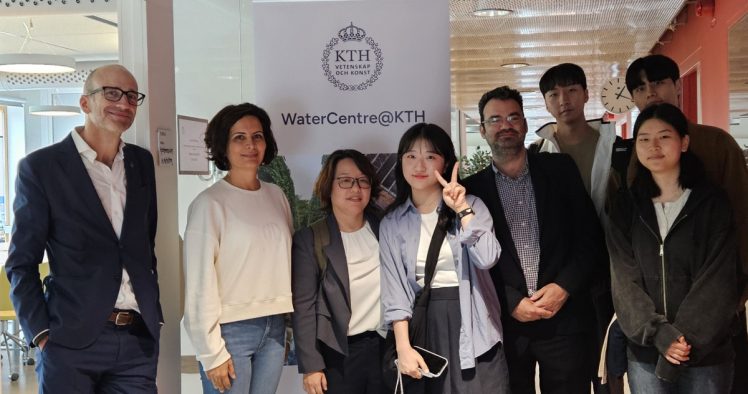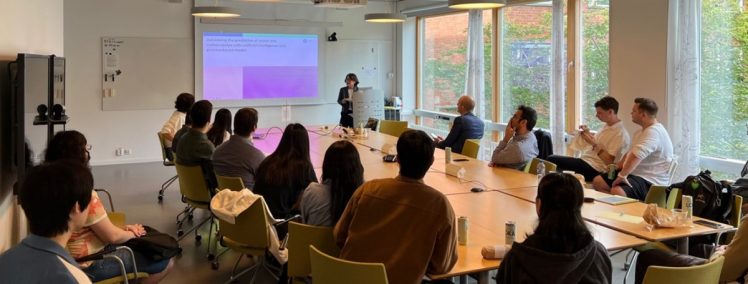HyeonKyeong LEE, is a student at Yonsei University, South Korea
 In August 2024, as part of the AI & Water Informatics Program in Civil and Environmental Engineering at Yonsei University, South Korea, I had the incredible opportunity to participate in World Water Week 2024 in Stockholm, Sweden.
In August 2024, as part of the AI & Water Informatics Program in Civil and Environmental Engineering at Yonsei University, South Korea, I had the incredible opportunity to participate in World Water Week 2024 in Stockholm, Sweden.
This event focused on fostering innovation in the digital water industry. It allowed me to explore global water industries, policies, and international organizations, offering a unique platform to cross boundaries and engage with key stakeholders. Additionally, we had the chance to present our research at KTH Royal Institute of Technology in Stockholm and engage in discussions on shared challenges, deepening our collaboration and insights.
Participating in World Water Week 2024
At World Water Week 2024, themed “Bridging Borders: Water for a Peaceful and Sustainable Future,” I had the extraordinary opportunity to engage with global water experts and policymakers, learning about the diverse and innovative approaches to tackling water challenges worldwide. One of the most impactful experiences was meeting Professor Taikan Oki, the recipient of the Stockholm Water Prize, a prestigious accolade often dubbed the Nobel Prize for the water sector. Hearing his insights and capturing a moment with him in a photograph was a great honor.
Professor Oki underscored the critical need to integrate groundwater and surface water into climate models, which traditionally focus solely on atmospheric factors. This integration is essential for understanding the comprehensive impacts of climate change. His discussion on balancing water resource management with flood prevention, especially given the intensified challenges posed by climate change, was particularly striking. It highlighted the complexity of managing reservoirs to address water storage needs and flood control.
This experience underscored the importance of translating scientific research into practical policies and the need for effective communication between researchers and policymakers. It also reinforced the necessity of evolving societal systems to achieve better environmental outcomes, emphasizing the critical role of global cooperation and strong governmental partnerships in addressing water-related issues.
Research Insights Shared at WaterCentre@KTH
 At the WaterCentre@KTH in Stockholm, we had the opportunity to hear Professor Yeonjoo Kim from Yonsei University, South Korea, present two innovative examples of how artificial intelligence (AI) and process-based models are being utilized to enhance predictions of water and carbon cycles across different scales. The first example involved a hybrid precipitation nowcasting model that combines a generative adversarial neural network (GAN) with a numerical weather prediction (WRF) model. This approach improves short-term rainfall forecasts by leveraging radar data and atmospheric physics, significantly enhancing accuracy up to six hours in advance, as demonstrated during a 2018 rainfall event in South Korea.
At the WaterCentre@KTH in Stockholm, we had the opportunity to hear Professor Yeonjoo Kim from Yonsei University, South Korea, present two innovative examples of how artificial intelligence (AI) and process-based models are being utilized to enhance predictions of water and carbon cycles across different scales. The first example involved a hybrid precipitation nowcasting model that combines a generative adversarial neural network (GAN) with a numerical weather prediction (WRF) model. This approach improves short-term rainfall forecasts by leveraging radar data and atmospheric physics, significantly enhancing accuracy up to six hours in advance, as demonstrated during a 2018 rainfall event in South Korea.
The second example, FireDL, is a deep learning framework for predicting fire behavior and carbon emissions. FireDL uses Long Short-Term Memory (LSTM) to forecast fire duration and Artificial Neural Networks (ANN) to estimate the burned area. Tested in Alaska, FireDL showed good performance in predicting large fires and integrating its predictions into the NCAR CLM5-BGC model to refine global carbon cycle models and assess wildfire impacts on climate change.
Unforgettable memories and impacts
My five-day experience in Stockholm, Sweden, has left me with unforgettable memories. As an undergraduate, it was particularly impactful to see firsthand how people from the other side of the world work together to tackle climate change and water crises. I was deeply moved by the realization that global efforts converge toward a common goal. This experience has given me hope that one day, through our collective efforts, we will create a world where water crises are a thing of the past and peace prevails.

No comments yet. Be the first to comment!